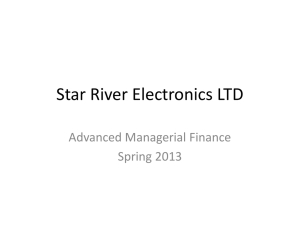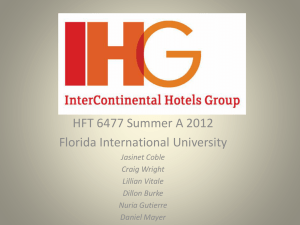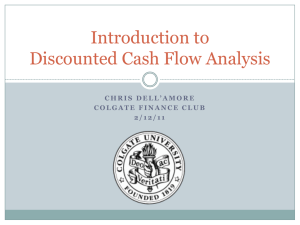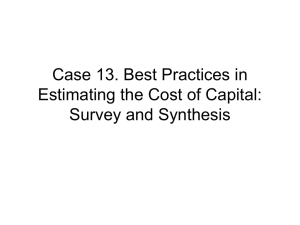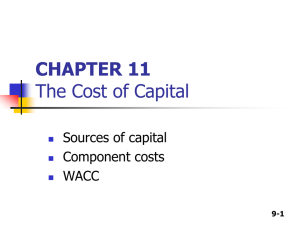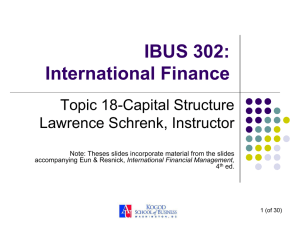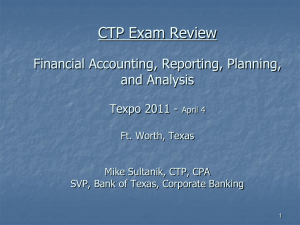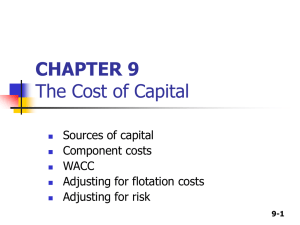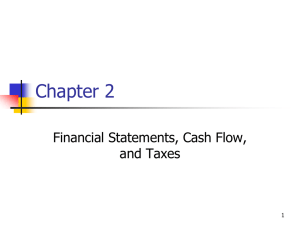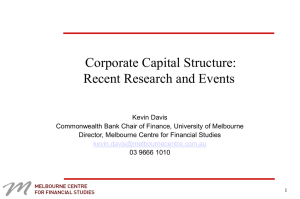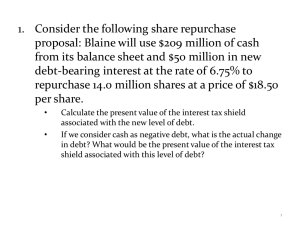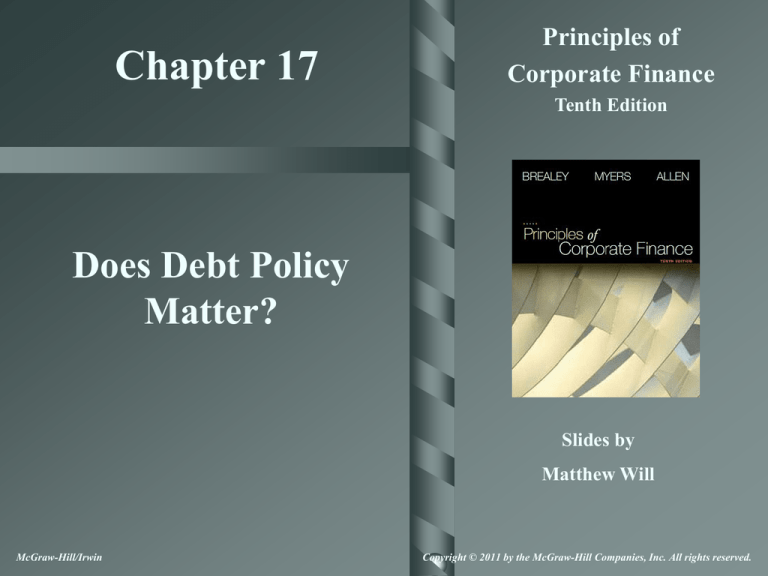
Chapter 17
Principles of
Corporate Finance
Tenth Edition
Does Debt Policy
Matter?
Slides by
Matthew Will
McGraw-Hill/Irwin
Copyright © 2011 by the McGraw-Hill Companies, Inc. All rights reserved.
Topics Covered
Financial Leverage in a Competitive Tax
Free Environment
Financial Risk and Expected Returns
The Weighted Average Cost of Capital
A Final Word on After Tax WACC
17-2
M&M (Debt Policy Doesn’t Matter)
Modigliani & Miller
– When there are no taxes and capital markets
function well, it makes no difference whether
the firm borrows or individual shareholders
borrow. Therefore, the market value of a
company does not depend on its capital
structure.
17-3
M&M (Debt Policy Doesn’t Matter)
Assumptions
By issuing 1 security rather than 2, company
diminishes investor choice. This does not reduce
value if:
– Investors do not need choice, OR
– There are sufficient alternative securities
Capital structure does not affect cash flows e.g...
– No taxes
– No bankruptcy costs
– No effect on management incentives
17-4
M&M (Debt Policy Doesn’t Matter)
Dollar Investment Dollar Return
.01VU
.01 Profits
Dollar Investment
Dollar Ret urn
Debt
.01DL
.01 Int erest
Equity
.01EL
.01 (P rofit s- Int erest)
T otal
.01(DL E L )
.01VL
.01 P rofit s
17-5
M&M (Debt Policy Doesn’t Matter)
Dollar Investment
Dollar Return
.01EL
.01 ( Profits- interest)
.01(VL DL )
Dollar Investment
Dollar Return
Borrowing
.01DL
- .01 Interest
Equity
.01VU
.01 Profits
T otal
.01(VU D L )
.01 ( Profits- Interest)
17-6
17-7
M&M (Debt Policy Doesn’t Matter)
Example - Macbeth Spot Removers - All Equity Financed
Data
Number of shares
1,000
P riceper share
$10
MarketValue of Shares $ 10,000
Outcomes
OperatingIncome
Earningsper share
Return on shares(%)
A
B
C
D
$500 1,000 1,500 2,000
$.50 1.00 1.50 2.00
5 % 10
15
20
Expected
outcome
17-8
M&M (Debt Policy Doesn’t Matter)
Example
cont.
50% debt
Dat a
Number of shares
500
P riceper share
$10
MarketValue of Shares $ 5,000
Market value of debt
$ 5,000
Out comes
A
B
C
D
Operat ingIncome
$500 1,000 1,500 2,000
Interest
$500 500
500
Equity earnings
Earningsper share
$0
$0
500
1
1,000 1,500
2
3
Return on shares (% )
0%
10
20
500
30
17-9
M&M (Debt Policy Doesn’t Matter)
Example - Macbeth’s
- All Equity Financed
- Debt replicated by investors
Outcomes
Earningson two shares
LESS : Interest@ 10%
Net earningson investment
Return on $10 investment (% )
A
$1.00
$1.00
$0
0%
B
2.00
1.00
1.00
10
C
3.00
1.00
2.00
20
D
4.00
1.00
3.00
30
Borrowing and EPS at Macbeth
17-10
No Magic in Financial Leverage
MM'S PROPOSITION I
If capital markets are doing their job,
firms cannot increase value by tinkering
with capital structure.
V is independent of the debt ratio.
AN EVERYDAY ANALOGY
It should cost no more to assemble a
chicken than to buy one whole.
17-11
17-12
Proposition I and Macbeth
Macbeth continued
CuttentStructure:
ProposedStructure:
Expectedearningsper share ($)
All Equity
1.50
Equal Debt and Equity
2.00
Priceper share ($)
10
10
Expectedreturn per share (%)
15
20
Leverage and Returns
Expected return on assets ra
17-13
expected operating income
market val ue of all securities
D
E
rA
rD
rE
DE
DE
M&M Proposition II
Macbeth continued
D
rE rA rA rD
E
expected operating income
rA
market val ue of all securities
1500
.15
10,000
17-14
M&M Proposition II
D
rE rA rA rD
E
Macbeth continued
expect edoperat ingincome
market value of all securit ies
1500
.15
10,000
rE rA
5000
rE .15 .15 .10
5000
.20 or 20%
17-15
17-16
Leverage and Risk
Macbeth continued
Leverage increases the risk of Macbeth shares
Operating Income
All equity
Earningsper share ($)
Return on shares
50 % debt : Earningsper share ($)
Return on shares
$1,500to $500
1.50
0.50
Change
- $1.00
15%
5%
- 10%
2
0
- $2.00
20%
0
- 20%
Leverage and Returns
Market Value Balance Sheet example
Asset Value
Asset Value
rd = 7.5%
re = 15%
100
100
Debt (D)
30
Equity (E)
70
Firm Value (V)
100
D
E
rA rD
r
E
DE
DE
30
70
rA .075
.
15
12.75%
100
100
17-17
Leverage and Returns
Market Value Balance Sheet example – continued
What happens to Re when the amount of debt is increased?
Asset Value
Asset Value
100
100
Debt (D)
40
Equity (E)
60
Firm Value (V)
100
rd = 7.5% changes to 7.875%
re = ??
40
60
.1275 .07875
re
100
100
re 16.0%
17-18
Leverage and Returns
D
E
BA BD BE
V
V
D
BE BA BA BD
E
17-19
WACC
WACC is the traditional view of capital
structure, risk and return.
D
E
WACC rA rD rE
V
V
17-20
17-21
WACC
r
rE
rA = WACC
rD
D
V
M&M Proposition II
17-22
WACC (traditional view)
17-23
After Tax WACC
The tax benefit from interest expense
deductibility must be included in the cost of
funds.
This tax benefit reduces the effective cost of
debt by a factor of the marginal tax rate.
D
E
WACC rD rE
V
V
Old Formula
17-24
After Tax WACC
17-25
Tax Adjusted Formula
E
D
WACC rD (1 Tc) rE
V
V
After Tax WACC
Example - Union Pacific
The firm has a marginal tax rate of
35%. The cost of equity is 9.9% and
the pretax cost of debt is 7.8%. Given
the book and market value balance
sheets, what is the tax adjusted WACC?
17-26
After Tax WACC
Example - Union Pacific - continued
Balance Sheet (Market Value, billions)
Assets
200
63
Debt
137
Equity
Total assets
200
200
Total liabilities
MARKET VALUES
17-27
After Tax WACC
Example - Union Pacific - continued
Debt ratio = (D/V) = 63/200= .315 or 31.5%
Equity ratio = (E/V) = 137/200 = .685 or 68.5%
E
D
WACC rD (1 Tc) rE
V
V
17-28
After Tax WACC
Example - Union Pacific - continued
E
D
WACC rD (1 Tc) rE
V
V
WACC (1 .35) .078 .315 .099.685
.084
8.4%
17-29
Union Pacific WACC
17-30
After Tax WACC
17-31
Another Example - Kate’s Cafe
Kate’s Café has a marginal tax rate of
35%. The cost of equity is 10.0% and
the pretax cost of debt is 5.5%. Given
the book and market value balance
sheets, what is the tax adjusted WACC?
After Tax WACC
Another Example - Kate’s Cafe- continued
Balance Sheet (Market Value, billions)
Assets
22.6
7.6
Debt
15
Equity
Total assets
22.6
22.6
Total liabilities
MARKET VALUES
17-32
After Tax WACC
Another Example - Kate’s Cafe- continued
Debt ratio = (D/V) = 7.6/22.6= .34 or 34%
Equity ratio = (E/V) = 15/22.6 = .66 or 66%
E
D
WACC rD (1 Tc) rE
V
V
17-33
After Tax WACC
Another Example - Kate’s Cafe- continued
E
D
WACC rD (1 Tc) rE
V
V
WACC .055 (1 .35).34 .10.66
.078
7.8%
17-34
Web Resources
Click to access web sites
Internet connection required
http://finance.yahoo.com
www.valuepro.net
17-35

